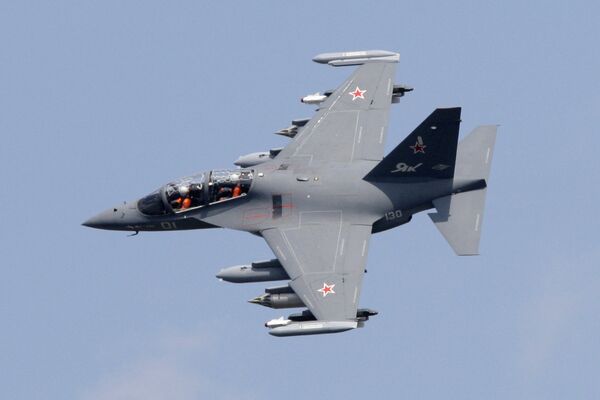Moscow’s announcement on Monday that it was refusing to make new arms sales to Syria came unexpectedly, after top Russian diplomats previously staunchly defended Russia’s right to supply arms to the embattled Assad regime.
“We are not talking about new arms supplies to that country,” Vyacheslav Dzirkaln, deputy head of the Federal Service for Military-Technical Cooperation said about Syria on Monday.
“Until the situation stabilizes we will not deliver any new weapons” to Syria, Dzirkaln said at the Farnborough airshow in Britain. He said this included, in particular, the 36 Yak-130 combat training aircraft that Syria was intending to purchase for a total price of $550 million.
From the onset of the conflict in Syria last spring, Russian Foreign Ministry and political leadership has persistently maintained that Moscow’s arms shipments do not violate any international laws and will be continued.
“We are completing right now the implementation of contracts that were signed and paid for a long time ago,” Foreign Minister Sergei Lavrov said in June. “We are not supplying the Syrian government with arms that even an overwrought imagination could suppose are being used against peaceful protesters.”
Lavrov’s remarks came after a Russian vessel carrying Mi-25 gunships to Syria was forced to turn back to Russia after its British insurer withdrew insurance cover in June. Moscow said the helicopter gunships it was carrying had undergone overhaul in Russia under a contract made before the outbreak of the Syrian conflict, and was not violating any international sanctions against Damascus.
Moscow gave no official explanation this week for its dramatic policy shift, but most Russian and Western analysts told RIA Novosti that Russia might be looking for a new balance between its reputation as a reliable arms supplier and as an international power-broker involved in resolution of the Syrian crisis.
Acting Out a Great Power
Russia has staunchly opposed any direct pressure on Assad’s regime, pushing instead for a national reconciliation effort in Syria. This has earned it much criticism from both the Western countries and the Sunni Arab nations, most of whom are geopolitical opponents of Syria, the main ally of Shia Iran.
“Yesterday's announcement shows that Russia is striking a balance between its reputation as a reliable arms supplier and its reputation as a Great Power that is supporting UN efforts to resolve the Syrian conflict,” said Nicholas Redman, a senior fellow at the International Institute for Strategic Studies, a London-based think-tank.
“This doesn't mean it is giving up on Assad,” Redman said.
“Moscow is sending a signal to the Syrians, telling them to sort out internal affairs in order to go on with cooperation, and to the West, showing that Russia will not back Assad’s regime at any cost,” said Pyotr Topychkanov, an analyst with the Moscow Carnegie Center think tank.
No Money for Arms
The decision to halt arms supplies to Syria comes at small financial cost for Russia because Damascus is hardly expected to fulfil even existing contracts, totaling $5 billion, said Ruslan Pukhov, the head of the Center for Analysis of Strategies and Technologies, or CAST, a Moscow think tank analyzing the arms trade.
Syria, which has so far only paid for less than half of all arms it contracted from Russia, is unlikely to be able to afford to pay up on existing contracts, let alone make new ones, Pukhov said.
If the rebels win and topple Assad, they would be unlikely to honor contracts made by the regime they have fought against, he said.
But even if Assad survives, his regime would be too weakened and drained economically to spend money on things like cutting-edge jet training aircraft, Pukhov said.
In any case, contracts with Syria only amount to around just five percent of all Russian arms exports, said Topychkanov of Carnegie Moscow Center.
“Our politics on Syria are not motivated by the interests of our military-industrial complex,” he said.
Not the First Time
As for damage to Russia’s reputation as a reliable arms supplier, that would likely be moderate because the country already has a track record of not always upholding its contracts where politics dictate a need, Pukhov said.
He cited, among others, a deal to sell S-300 air defense missile systems to Iran, which fell through twice, once under President Boris Yeltsin in the 1990s and once in 2010, when the Kremlin halted the sale citing UN sanctions against Tehran.
Even with Syria, Russia has done it before: Vladimir Putin canceled a deal for advanced Iskander surface-to-surface missiles in the late 2000s, and a contract for MiG-31 interceptors was frozen in 2009, as was an S-300 contract, although that was not publicized, said another CAST analyst, Ruslan Aliyev.
“Moscow pursues a hypersensitive approach toward arms supplies to the Middle East and is constantly in consultation with Israel and the United States on what it should or should not deliver to countries in the region, and when,” he added.
In any case, the refusal will not trouble Assad’s regime if it finds itself in need of more weaponry, said Yevgeny Satanovsky, head of the Moscow-based Middle East Studies Institute.
“Syria is located at a crossroads for global arms trafficking,” Satanovsky said. “And besides, Iran can always help.”
RIA Novosti reporters Howard Gethin and Alexander Stelliferovsky contributed to this report.

